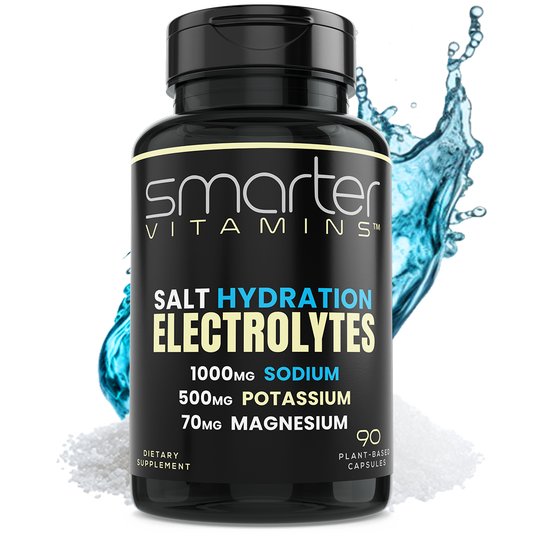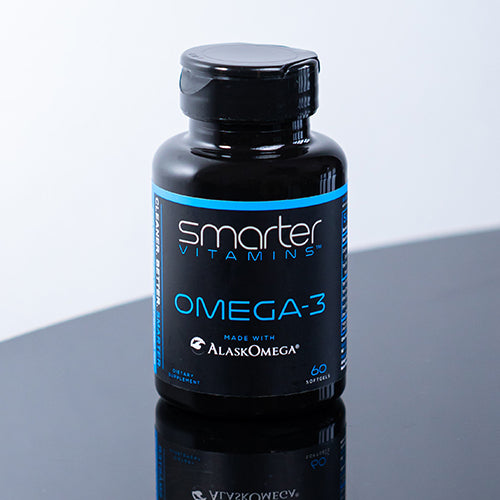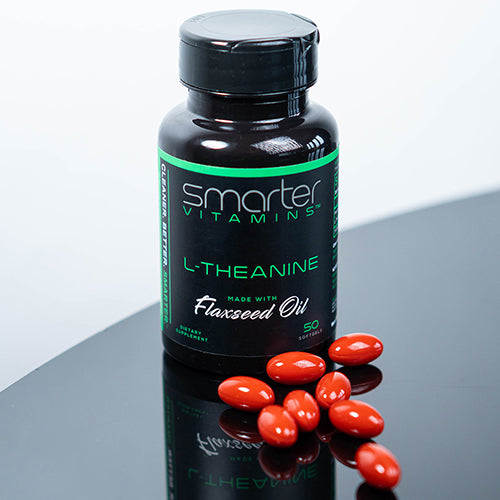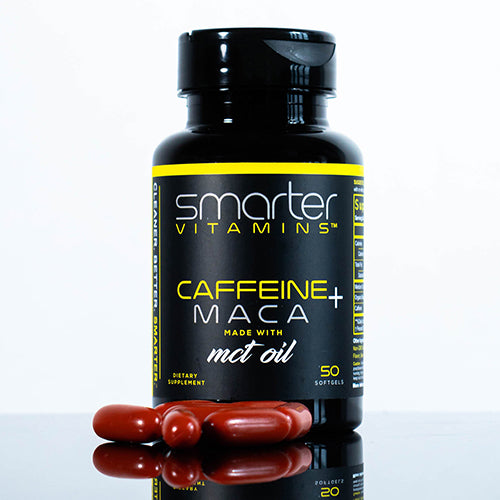Cleaner. Better. Smarter.
Made without the weird stuff!
magnesium stearate | dioxides | maltodextrin | carrageenan | soy milk | artificial colors | FD&C blue #1 #2 | FD&C green #3 | FD&C red #3 #40 | FD&C yellow #5 #6 | gluten | wheat | peanut | sugar | starch | lactose | soy bean oil | triacetin | corn oil | palm oil | talc | preservatives
Why is Caffeine + L-Theanine Different?
Backed by Science
Replace stimulants and artificial cognitive enhancers with natures most potent nootropic.
Does L-Theanine help with ADHD/ADD
A study published in the Journal of the Alternative Medicine Review explored L-theanine's effects on boys with attention deficit hyperactivity disorder (ADHD). The study involved administering 200 mg of L-theanine twice daily, resulting in improved sleep patterns and a deeper, more restful sleep. Additionally, theanine increases activity in the alpha frequency band in the brain. This increased activity in the alpha frequency band causes feelings of relaxation without feeling drowsy, which could increase focus. And relaxation aids sleep.
Does Caffeine+L-Theanine affect my sleep?
L-theanine is an amino acid offering a unique biphasic response: it boosts alertness while promoting better sleep.
Frequentlyasked questions
What is Caffeine?
Caffeine is a central nervous system stimulant. It is a substance that is found naturally in leaves, seeds, and fruits of plants. More specifically, it is found naturally in coffee, tea, cocoa and cocoa products, and some flavorings.*
Caffeine is also added to foods including sodas, energy drinks, chocolate flavored milk, yogurts, frozen desserts, and some medicine such as over-the-counter pain relievers.*
Although caffeine is classified as “GRAS” (generally recognized as safe) by the FDA, some people can be sensitive to its effects. Those sensitivities include insomnia, headaches, irritability, nervousness, and migraine headaches. The effects of caffeine intake on an individual can vary and depend on many factors, such as body weight, how much is consumed, how often its consumed, and overall health status.*
Caffeine is also added to foods including sodas, energy drinks, chocolate flavored milk, yogurts, frozen desserts, and some medicine such as over-the-counter pain relievers.*
Although caffeine is classified as “GRAS” (generally recognized as safe) by the FDA, some people can be sensitive to its effects. Those sensitivities include insomnia, headaches, irritability, nervousness, and migraine headaches. The effects of caffeine intake on an individual can vary and depend on many factors, such as body weight, how much is consumed, how often its consumed, and overall health status.*
Is L-Theanine natural?
L-theanine, predominantly found in tea leaves, is the biological constituent of green tea, responsible for that serene yet alert feeling after a cup of green tea. It's an amino acid that can be easily obtained, offering a unique biphasic response: it boosts alertness while promoting better sleep.
The Role of GABA and Glutamate?
Theanine's magic lies in its ability to modulate brain chemistry, particularly the balance between glutamate and gamma-aminobutyric acid (GABA). While glutamate is associated with heightened brain activity and anxiety, GABA promotes relaxation. Theanine binds to glutamate receptors, blocking glutamate's impact and subtly increasing the GABA to glutamate ratio. This balance is why green tea can energize without the jitters often associated with caffeine.
L-Theanine as an Antioxidant?
Interestingly, L-theanine also functions as an antioxidant. It blocks the glutamate receptor, reducing the brain's demand for high energy, which can lead to oxidative stress. This antioxidant property, coupled with its relaxing effects, makes L-theanine a unique and beneficial supplement.
Alpha Waves: The Key to Focus and Creativity?
L-theanine promotes alpha wave oscillation in the brain, associated with a state of relaxed alertness. These waves are prevalent during activities like meditation or deep workouts, where focus is paramount. By enhancing alpha wave activity, L-theanine minimizes distractions, allowing for heightened concentration and creativity.
How do Caffeine supplements work?
Caffeine is a stimulant that works by binding to adenosine receptors in the brain. Adenosine is a neurotransmitter that promotes feelings of drowsiness and fatigue. As caffeine binds to these receptors, it blocks the effects of adenosine and increases the activity of other neurotransmitters, such as dopamine and norepinephrine, which can lead to increased alertness and energy.*
Caffeine supplements come in different forms such as tablets, capsules and powders. They are usually taken orally and can be taken as needed or on a regular schedule. The effects of caffeine can be felt within minutes of taking a supplement and typically last for several hours.*
It's important to note that caffeine sensitivity varies from person to person, and the effects can also be affected by factors such as overall health, medications, and stress levels. Consuming too much caffeine can lead to side effects such as jitters, anxiety, and insomnia. It's always recommended to start with a small dose and increase gradually as needed. It's also recommended to not exceed the recommended daily dose and to consult with a healthcare professional before taking caffeine supplements or making any significant changes to your caffeine intake.*
Caffeine supplements come in different forms such as tablets, capsules and powders. They are usually taken orally and can be taken as needed or on a regular schedule. The effects of caffeine can be felt within minutes of taking a supplement and typically last for several hours.*
It's important to note that caffeine sensitivity varies from person to person, and the effects can also be affected by factors such as overall health, medications, and stress levels. Consuming too much caffeine can lead to side effects such as jitters, anxiety, and insomnia. It's always recommended to start with a small dose and increase gradually as needed. It's also recommended to not exceed the recommended daily dose and to consult with a healthcare professional before taking caffeine supplements or making any significant changes to your caffeine intake.*
How much Caffeine can i consume a day?
For healthy adults, the FDA has said 400 mg per day. Coffee houses often have this much caffeine in one large cup. Many people are consuming 3-4 of these coffee’s daily. We recommend taking one softgel (200mg) and see how that works for you and if needed use 2 softgels (400mg).*
Does Caffeine cause insomnia?
The short the answer is maybe, maybe not. It really depends on an individual basis. Some people are more sensitive to it than others.However, there are people who can have a cup of coffee after dinner and not be affected at all.*
Scientifically, after 8 hours, 75% of caffeine that we have consumed is out of our system. As we grow older, we become more and more sensitive to caffeine. So when you were younger, you may have been able to drink coffee or have tea at dinner without issue, but now you may have a hard time falling asleep. It could be the caffeine keeping you awake. However, some caffeine in the morning most likely will not affect sleep.*
Scientifically, after 8 hours, 75% of caffeine that we have consumed is out of our system. As we grow older, we become more and more sensitive to caffeine. So when you were younger, you may have been able to drink coffee or have tea at dinner without issue, but now you may have a hard time falling asleep. It could be the caffeine keeping you awake. However, some caffeine in the morning most likely will not affect sleep.*
Does Caffeine cause dehydration?
Caffeine has a diuretic effect that will increase urine output. Caffeine may cause dehydration in some individuals.*
Does Caffeine cause jitters?
Caffeine can cause jitters, as well as other side effects such as increased heart rate, anxiety, and insomnia in some people. The intensity and duration of these side effects can vary depending on the individual and the amount of caffeine consumed.*
How does L-Theanine and MCT oil help reduce Caffeine jitters?
L-theanine is believed to help reduce caffeine jitters by increasing levels of GABA, a neurotransmitter that promotes relaxation and reduces anxiety. L-theanine also increases the levels of serotonin and dopamine in the brain, which can also have a calming effect.*
MCT oil can help improve overall energy and focus which can reduce the negative effects of caffeine jitters, as it is quickly metabolized by the body and can be used as an energy source, also MCTs have been shown to increase ketone levels and enhance cognitive performance. However, MCT oil does not directly affect the jitters caused by caffeine.*
It's important to note that more research is needed to fully understand the mechanisms by which L-theanine and MCT oil may help reduce caffeine jitters, but these supplements may be beneficial for some people. As always, it's best to consult with a healthcare professional before taking supplements or making any significant changes to your diet or supplement regimen.*
MCT oil can help improve overall energy and focus which can reduce the negative effects of caffeine jitters, as it is quickly metabolized by the body and can be used as an energy source, also MCTs have been shown to increase ketone levels and enhance cognitive performance. However, MCT oil does not directly affect the jitters caused by caffeine.*
It's important to note that more research is needed to fully understand the mechanisms by which L-theanine and MCT oil may help reduce caffeine jitters, but these supplements may be beneficial for some people. As always, it's best to consult with a healthcare professional before taking supplements or making any significant changes to your diet or supplement regimen.*
NO BS. (Bad Stuff)
• fillers
• magnesium
• stearate
• dioxides
• silica
• maltodextrin
• carrageenan
• soy
milk
• artificial colors
• FD&C blue #1 #2
• FD&C green #3
• FD&C red #3 #40
• FD&C yellow #5 #6
• gluten
• wheat
• peanut
• sugar
• starch
• sodium
• lactose
• soy bean oil
• triacetin
• corn oil
• palm oil
• talc
• preservatives
Why you should choose SmarterVitamins Caffeine + L-Theanine Capsules
What else is inside Caffeine + L-Theanine?
MCT Oil
MCT Oil supercharges your brain, sharpening your mental clarity and focus like never before. Your cognitive performance will skyrocket, and you'll be able to tackle even the most demanding tasks with ease and confidence.
Fast Shipping
Risk Free
Made Here
Est 2016
Made with Non-GMO Ingredients
(cGMP) Good Manufacturing Practice
Third Party
Tested
Made in a FDA
Registered Facility
Other top rated supplements
Return Policy
Customer Satisfaction is our #1 Priority
If you are unhappy with a product,
simply return it within 60 days of recieving it
and we'll give you a full refund.
It's that simple.
It's that simple.
RESOURCES
The neuropharmacology of L-theanine(N-ethyl-L-glutamine): a possible neuroprotective and cognitive enhancing agent. J Herb Pharmacother. 2006;6(2):21-30.
Acute effects of tea constituents L-theanine, caffeine, and epigallocatechin gallate on cognitive function and mood: a systematic review and meta-analysis. Nutr Rev.2014;72(8):507-22.
Fish consumption and stroke risk in elderly individuals: The cardiovascular health study. Arch Intern Med. 2005;165(2):200-206.
Changes in cerebral blood flow and carbohydrate metabolism during acute hyperketonemia. Am J Physiol. 1996;270(5 Pt 1):E746-51.
Rethinking fat as a fuel for endurance exercise. Eur J Sport Sci.2015;15(1):13-20.
Caffeine to optimize cognitive function for military mission-readiness: a systematic review and recommendations for the field.
The combination of L-theanine and caffeine improves cognitive performance and increases subjective alertness.
Caffeine effects on marksmanship during high-stress military training with 72-hour sleep deprivation.















